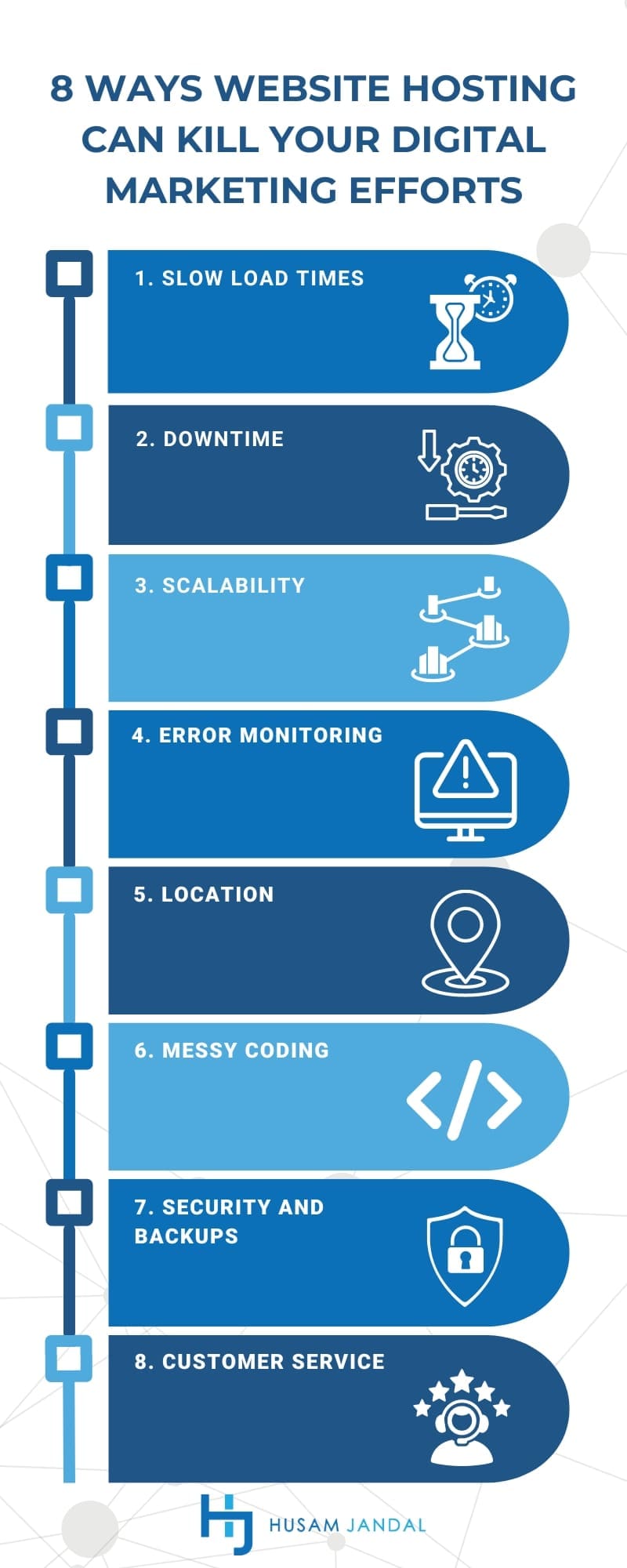 Setting up a new business website or troubleshooting issues on your current one? You may want to take a harder look at the website hosting provider you choose.
Setting up a new business website or troubleshooting issues on your current one? You may want to take a harder look at the website hosting provider you choose.
While many businesses focus on the design and development aspects of websites or making sure they have the right content for their audiences, what’s happening in the background makes a huge difference in the performance of your website too. Give me a few minutes and I’ll walk you through the basics, then help you identify what type of host is best for your needs.
What is Website Hosting?
A web hosting service provider or web host provides the technology for a website to be viewed online. It’s kind of like how you store files on your computer, but in this case, the files are stored on a server that the hosting company maintains and makes accessible to others.
Sometimes website hosting is offered as a standalone service, but you’ll also see it in bundles with things like a domain name, email, and website builder.
What Types of Website Hosting Are Offered?
As you explore your options, you’ll hear terms like shared, dedicated, VPS, and cloud used.
- Shared website hosting means your website shares a server with other websites. It’s typically the most cost-effective website hosting option, but it also means all resources are shared with the other sites. For example, when a large amount of traffic descends on one site, it can slow the traffic on other sites on the same server.
- Dedicated website hosting, sometimes referred to as managed hosting, refers to having a server that’s rented exclusively to your business. It’s more expensive than shared hosting, but you’re not sharing resources with other websites. That means your site won’t be impacted by traffic to other sites and similar concerns.
- VPS is short for a virtual private server. It’s also referred to as a virtual dedicated server or VPS. This type of arrangement hosts your data alongside other websites, but when bots and browsers visit your site, they think it’s a dedicated server. It’s also compartmentalized, so it behaves more like dedicated hosting. As a result, your site won’t be impacted by huge traffic spikes to another website. Think of it more as a hybrid between dedicated and shared. It won’t be as expensive as dedicated but offers benefits shared hosting doesn’t.
- Cloud hosting is one of the newer terms to hit the market. It refers to having your data hosted by a network of dedicated computers in the cloud. It opens doors for companies that have lots of data, run resource-intensive applications, or cannot afford to have any downtime, but it’s the most expensive of the options listed here.
It’s also worth noting that you may come across hosting resellers too. In these cases, a business purchases or rents extra space and then resells it to others. Furthermore, beware of vendors promoting their Shared hosting plans as “Cloud”; they do not meet the true meaning of a dedicated Cloud hosting setup.
8 Ways Website Hosting Can Kill Your Digital Marketing Efforts
If you read the part about your site slowing down because another site had an influx of traffic, and alarm bells went off in your head, you’ve already caught one of the biggest ways website hosting impacts digital marketing. However, this is only one aspect, and it only scratches the surface. Let’s take a deeper look.

1. Slow Load Times
Because more people are accessing websites on mobile devices these days, Google prioritizes the mobile experience when it sizes up websites and landing pages. The average site takes about 15 seconds to load, according to the search engine giant. That doesn’t sound so bad at first glance, but the probability of a visitor “bouncing” (leaving without taking any actions or viewing other pages) jumps by 32 percent when a page takes one to three seconds to load. At one to five seconds, the probability of a bounce climbs by 90 percent. At one to six seconds, bounce probability jumps to 106 percent.
In other words, you need your site to load within three seconds to keep people on the page. Google and other search engines recognize this, so they include load times in their algorithms and reward sites with faster load times with higher ranking in search results.
Being on a shared website hosting plan will naturally impact load speed from time to time, even when a website hosting provider balances the websites sharing a server carefully. However, not all providers worry about balance, and the amount of traffic is only one factor that influences speed.
2. Downtime
All website hosting providers rely on real-world hardware and software. Even if you’re hosting in the cloud, there are physical servers somewhere that host your data. They need to be maintained and updated just like your office, or home computer does.
A hosting company can’t promise 100 percent uptime for this reason. However, the best hosting companies will put measures in place that ensure your uptime is maximized and will typically boast an uptime rate of 99 percent or more.
Downtime impacts your site in many ways. Naturally, people can’t access your site when it’s down. That puts an immediate dent in your traffic. It can also reduce traffic over time, as people stop depending on your site as a source of information or help. Search engines notice when your site is down too. You’ll begin to drop in rankings as your site becomes unreliable.
3. Scalability
It’s important to think of both short-term and long-term scalability when it comes to website hosting. For example, some sites have slowdowns when lots of traffic hits or set limits to avoid resource allocation issues. That might not be a problem most of the time, but what if your business runs a successful email campaign and you get a deluge of clicks or content you’ve published goes viral? You’re undermining your efforts if they can’t get through to your website or leave because your site speeds are throttled.
Equally, long-term scalability matters too. If your site can’t handle your future traffic, can’t handle upgrades, or you’re unable to migrate your data to a new host and site, your website host can hinder business growth.
4. Error Monitoring
Well-maintained websites are constantly evolving. You’ll update plugins and add-ons, update pages, remove old pages, and so forth. Browsers are constantly evolving and updating their coding too, which can change how your site displays and functions. You must be on top of these changes to ensure your visitors have a good experience.
Error monitoring is a part of that. Some web hosting companies monitor for you or at least make it easy to install code and plugins that handle monitoring. Others, especially the type that bundles website builders with hosting, generally don’t offer error monitoring and can sometimes make it difficult to leverage third-party applications.
5. Location
It may go without saying, but the farther your server is from the person visiting your website, the longer it takes data to travel and the longer it takes your site and features to load. Therefore, it’s beneficial to have your website hosted near your customer base for that reason alone.
However, some search engines also look at your server’s location to determine ranking. “The server location is often physically near your users and can be a signal about your site’s intended audience,” according to Google Search Central. The search engine notes it uses this info to determine a target locale, so it can impact who sees your website or page as well, though it doesn’t consider location a definitive signal.
6. Messy Coding
The need for clean coding is often overlooked. Think of how you might read a book, then imagine you reach a line in which you’re told you must read a paragraph in another book before moving forward. If it only happens once or twice, it won’t slow you down too much, but if it happens repeatedly, or if the secondary books send you to other sources to read before moving forward, you’re going to slow down considerably. The same thing happens with websites.
WordPress sites and those with similar frameworks can sometimes behave this way. However, website hosting companies sometimes inject their own code too. This is seen more often when the host also provides a website builder.
7. Security and Backups
Webmasters are often cautioned about the importance of updating plugins to reduce security risks, but it’s rarely mentioned that hosting companies have similar risks. Paulos Yibelo, a self-proclaimed “bug hunter” (AKA white-hat hacker) discovered vulnerabilities in five well-known hosting providers a few years back per TechCrunch reports. The issues meant that other hackers could target around seven million domains, often taking over a user’s full account.
It can take businesses years and hundreds of thousands of dollars to recover from a cyberattack. Search engines are also wary of ranking sites that have been compromised in the past as well. But, even small-scale attacks or corrupt data can derail a company’s online footprint without a good backup. Some hosting companies keep them for you and offer guarantees, while others leave it to you to find a solution.
8. Customer Service
Although the level of service you receive from your website hosting company doesn’t directly impact your digital marketing, many of the above concerns can be addressed through quality customer service, assistance when you need it, and professional insights when you’re not sure which services are right for your needs.
Unfortunately, many hosting providers fall short in this department. Some are unhelpful or slow to respond. Others don’t have live support options at all. Customer service is a big deal when your hard-earned SEO ranking and reputation are on the line.
How Do I Choose Good Website Hosting?
The right website hosting provider and plan will vary based on your company’s needs. A few questions to consider as you make your decision are highlighted below.
- Can the hosting provider scale with my needs?
- How fast will my site load?
- What kind of uptime does the company guarantee?
- Will the hosting provider help keep my site and data secure?
- Will the provider enable me to ensure my site is running optimally?
- Will the location of my server impact my visitors and SEO positively?
- Who will help me and how will they help if I have an issue?
Get Help from an Experienced Digital Marketing Consultant
Choosing the right website hosting provider is only one of many decisions you’ll make as you move forward. As an experienced digital marketing consultant, I can help you find the right services for your needs, build out your marketing strategy, and get the results your business deserves. If you’re not sure what the best path forward is or think you can benefit from having a specialist on your side, contact me for a complimentary consultation.





































































